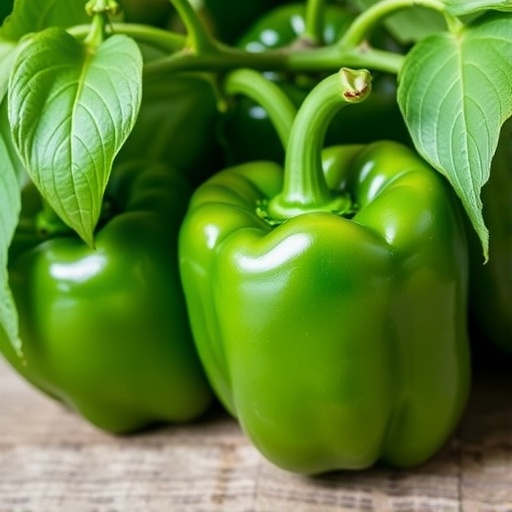The escalating problem of food waste has become a global concern, particularly in agricultural sectors where produce is abundant yet often goes unutilized. Recent research from Baessa et al. delves into the underappreciated potential of bell pepper waste, shedding light on its chemical composition and bioactive properties. This innovative study suggests that bell pepper residues, often dismissed as mere byproducts, could be the key to addressing significant waste issues, while simultaneously unlocking valuable compounds that could be beneficial for various industries, including pharmaceuticals and nutrition.
Bell peppers, known scientifically as Capsicum annuum, are celebrated for their vibrant colors and nutritional benefits. However, the cultivation of these vegetables often leads to a multitude of discarded parts, such as seeds, stems, and skins. These byproducts typically find their way into landfills, contributing to environmental concerns without providing any value. The research conducted by Baessa and colleagues reveals that these neglected elements are rich in bioactive compounds, which could serve numerous applications beyond waste disposal.
Through meticulous analysis, the study identifies and quantifies the chemical constituents found in bell pepper waste. The presence of phenolic compounds, flavonoids, and carotenoids stands out, known for their antioxidant properties. These components not only enhance the nutritional profile of the waste but also suggest that bell pepper byproducts could have far-reaching implications as functional foods or natural additives in food products. The implications are significant, particularly in a world increasingly focused on health and wellness.
Moreover, the research has practical applications in food science and technology. For instance, the antioxidants found in bell pepper waste could be harnessed to improve the shelf life of food products, potentially reducing the need for synthetic preservatives. This could lead to healthier alternative products that appeal to a consumer market shifting towards organic and natural choices. By extracting these beneficial compounds, manufacturers could not only minimize waste but also enhance the value of their products, aligning with contemporary sustainability goals.
The bioactive potential of bell pepper waste is not limited to food processing, however. The compounds identified in the study also exhibit promising pharmacological properties. For instance, certain flavonoids have been linked to anti-inflammatory effects, while carotenoids are recognized for their role in reducing the risk of chronic diseases such as cancer and cardiovascular ailments. This connection enhances the allure of bell pepper waste and opens the door to its use in nutraceuticals, thereby creating an entirely new market for these residues.
Commercially, this study posits that entrepreneurs could leverage bell pepper waste to forge new business ventures. By partnering with agricultural producers, companies could develop extraction processes to isolate the valuable compounds for use in dietary supplements, cosmetics, or even personal care products. This not only addresses the issue of waste but can also yield profitable products, showcasing how a circular economy can transcend traditional agricultural practices.
In terms of environmental impact, reducing waste through valorization aligns with global sustainability goals. By employing strategies that utilize food residues, researchers advocate for a transformative approach to waste management. This research supports the notion that food waste should not be viewed merely as a liability but rather as an underutilized resource that holds exceptional potential for both the environment and the economy.
In conclusion, the findings from Baessa et al. represent a critical advancement in our understanding of food waste management. The valorization of bell pepper waste highlights a path forward that redefines how we view agricultural byproducts. Not only does this research provide a roadmap for potential economic benefits, but it also emphasizes the importance of innovation in addressing food waste’s environmental impact. If embraced widely, such approaches could transform the agricultural landscape, leading to healthier products and a more sustainable future.
The study paves the way for further exploration into other types of food waste, encouraging researchers to investigate similar possibilities in various crops. As the agricultural industry faces ever-increasing scrutiny regarding its waste output, innovative solutions like those proposed by Baessa et al. offer hope. By shifting perceptions and practices surrounding food waste, such research can play a pivotal role in advancing sustainability in food systems worldwide.
As societies continue to grapple with the implications of food waste and its environmental footprint, studies like this underscore the importance of interdisciplinary research. Collaboration among agricultural scientists, food technologists, and environmentalists will be essential in fostering a holistic approach to waste transformation. Engaging with stakeholders across the value chain may lead to novel pathways that enhance both economic viability and ecological soundness.
Ultimately, the valorization of bell pepper waste serves as an inspiring case study, highlighting the dual purpose of promoting sustainability while unlocking the inherent value within waste. By reconceptualizing waste as a resource, we can take meaningful strides toward a future where agricultural efficiency and environmental stewardship go hand in hand.
Subject of Research: Valorization of Bell Pepper Waste and Its Bioactive Potential
Article Title: Valorization of Waste from Bell Pepper: Chemical Composition and Bioactive Potential
Article References:
Baessa, J., Liberal, Â., Finimundy, T. et al. Valorization of Waste from Bell Pepper: Chemical Composition and Bioactive Potential.
Waste Biomass Valor (2025). https://doi.org/10.1007/s12649-025-03395-w
Image Credits: AI Generated
DOI: https://doi.org/10.1007/s12649-025-03395-w
Keywords: food waste, bell pepper, valorization, bioactive compounds, sustainability, antioxidants, agriculture, circular economy, nutraceuticals.




